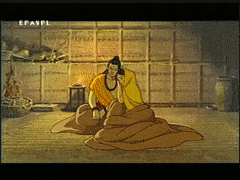அற்பின் அவத்தை
வளையாபதியின் புதல்வி, அவள்
சீர் மாவர்க்கு மேகங்களைத் தூதுவிடுகிறாள்,
வானத்தை வென்றுடைத்த வல்லவன்
வெற்றியுடன் வருவீர்! என்று
வேண்டுகோள், ஆயின்
வெந்துயர் தெளிந்தவன் அவன் அன்று,
வைகை வணங்கி வடக்கிருத்தான் ஆம்,
அவன் ஆன்மா ஆதியை அடைந்த நாள் தளர்ந்தும்,
அவன் காதல் ஈவான் என்று,
(கண்ணிமைக்கா) காத்திருக்கும் கன்னிகை,
கார்மேகங்கள் சூழ்ந்துவிட்டதைக் காண்பாள் ஆயின்,
காலம் அறியாமற் கலக்கம் கவழ்வாள் ஆயின்,
அவள் அனந்தல் களைவதற்குக்
கண்ணீர் விடுத்து
ஈகை அருள்வீர் ஓர் எம்பாவை!
* Avan Anru --> wordplay + run-on lines: "He is not" for the previous line, and "That day, he" for the next lineA very simple (VERY poor) translation by myself: The daughter of the Unassailable, she Sends the clouds as messages to her Good-bodied man, that The Skilled one who Won the skies You will return with Victory! Though her appeal was such He is one who has yet to defeat his misery*, Praying before Vaigai, he meditates to death (literally), It seems/Yes, Even though the day his soul had reached God had already withered, The maiden continues to long without blinking, That he will return to give his love, However, If she does not come to realise sooner, that the black clouds have begun to engulf the skies, and disillusioned, she yet fails to recognise that seasons have passed, Please do charity to her that her dream must dissipate, By shedding your tears, my fellow damsels.
In English letters: Valaiyapathiyin pudhalvi, aval Seer maavarku megangalaith thoodhuvidugiraal, Vanathai Vendrudaitha vallavan Vettriyudan varuveer enru Vaendudhal aayin Venthuyar thelindhavan avan anru Vaigai vanangi vadakkirundhaan Aam, Avan aanma aadhiyai adaindha naal thalarndhum Avan Kaadhal eevaan enru, Kannimaikka Kaathirukkum kannigai Kaarmegangal soozhndhuvittadhai kaanbaal aayin, Kaalam ariyamar kalakkam kavazhvaal aayin, Aval Anandhal kalaivadharku Kaneer viduthu eegai arulveer or empavai
Okay so cut short, I am not going to analyse the poem too much as I have an exam tomorrow + open to artist impressions!:
My poem alludes to Thirupaavai (you can even consider it as a commentary on it cus it shows the miserable state of obessessing over someone + also it ends with “empaavai”) as well as Kamba Ramayanam (the use of “Aayin” and “Aam” as well as the title)
Sort of like kannadasan’s “aatanathi aadhimandhi” where you have a story in the poem itself
Apologies if I did not place “க்” in the right places
அற்பின் —> a word from Kamba Ramayanam —> it means அன்பினால்
—> By / Due to love
அவத்தை —> has two meanings: Condition of mind in love + Pain (lol the irony, but our ancestors knew).
About the Allusions + Controversial perspectives
Allusion to Aandal
Okay so, if you’re familiar with Tamil Hindu culture/gods, you would know who Aandal is. For those who do not, here is my dispassionate introduction to her (I’m sorry if I am disrespectful): Aandal is a Goddess who was a mortal, and she had spent her time in relentless devotion towards Vishnu/Perumal, a Hindu Deity.
Once she took the garland that was placed upon his idol, and put it onto herself (kind of recreating the Indian marriage scene where you exchange garlands)…. Her dad who was the priest got shookt asf and reprimanded her a ton, but then the God came in his dream to tell him not to prevent Aandal from expressing her devotion. The story ends with Vishnu himself coming down to marry Aandal.
For a 21st century mind, I was always deeply skeptical about Aandal’s story, because it just does not resonate with me. I think that’s part of the freedom in my religion because I can question it, so phew.
Thiruppavai, which I had mentioned earlier, was one of her works, along with Nachiyar Thirumozhi, which are devotional songs towards Lord Perumal.
These works are a great asset to Tamil Literature, but personally, I’m a little dismissive of them, clearly because I do not understand the part of venerating her:
Idk man, her works show her to be extremely obsessive over a deity, I wonder, if in the case that it was not the actual “God” who came down, could it be that the father got some dude to roleplay as Vishnu, you never know. (I’m sorry if I am disrespecting her devotion, but I just do not vibe with it)
I think what I expressed in this poem is precisely the fact that it ends with the persona expressing concern over a delusional young woman, who denies the reality that her lover is already dead, and asks the other damsels to weep in pity of her state.
The ending “Or empavai” (pronounce: oar em-paa-vaai-ii) alludes to the Thiruppavai because most, if not all the poems in it end with that very phrase, as Aandal tells her fellow damsels (friends) to love/understand the Lord. But obviously in my poem, the addition of it kind of discourages the very sort of emotion that Aandal propogates — hopefully I do not get any hate letters lol.
Additionally, the use of “seer maavarku” (i dont really know the exact translation for this in english, it seems to be like good-chested/bodied/shouldered) which is used by Aandal in one of her poems to refer to Vishnu. SO you can say my poem is directly in discouragement of blind love/venerations.
I’m just wondering about the hypocrisy of the brahminisation/sanskritisation of Vaishnavism. Because the sanskritisation of indigenous Hindu cultures tweaked much of their normalcy into something more conservative — Which makes it hypocritcial that vaishnavite Brahmins venerate Aandal alot because her Nachiyar Thirumozhi tends to get sexual, but they look down upon (used to, probably not now, but I will point out their discriminations nonetheless) sexual things in general, as well as indigenous traditions that are not conservative.
I am just not a huge fan of Aandal, because I do not advocate anyone to indulge themselves in that extent of devotion, especially in this day and age (it’s just delusional, they’ll put you in a mental health institution).
If I were like Aandal, writing love letters to Lord Vishnu, two things will happen:
- I will get beaten tf out by my parents cus they will think it’s some randomass guy called Vishnu and not the Deity,- People will be aghast that I have the guts to think and write sexual fantasies of a God (okay, at this point, I think Gods in Hinduism used to be viewed like how Kpop idols are by their fans lmaoo no wonder) —> the very people who respect and worship Aandal will get SUPER MAD at me.
Nonetheless, I do admire that Aandal lived her life as she wanted (autonomy in the age where women were subjected to behave and act certain ways), and I do love her works, because the poems are ze top-notch.
Okay I kind of got carried away but I hope you could see the allusions nonethless eheh.
Allusion to Ramavataram
Ramavataram, otherwise known as Kambar’s Ramayanam:
- I’m a HUGE FAN of this work. I really think this is far more better than Valmiki’s, but that is probably because I am Tamil lol.
What makes this adaptation better is the fact that Ramayana is intricately layered with Kambar’s literary techniques AND ethical commentaries, but it is sooooo SUBTLE that it makes it sooooooo beautiful to decode it 😭😭😭😭😭😭o m gee ok oof I’ll breathe.
Valmiki Ramayana will probably make you dislike characters like Rama (cus he put his wife through a test of chastity listening to randomass locals) and Soorpanagai (cus she’s a demon), but the beauty of Kambar’s Ramayanam is that he makes you empathise and like these characters. He brings you to a different realm where you accept and understand the nuances of each characters.
Okay so as mentioned, the allusions are expressed by the use of “arpu” in the title, which is a word from the Ramavataram itself, and then the frequent use of “Aayin” and “Aam” . A very lame way to allude, but hey, I tried.
Particularly, I alluded to one of my favourite lines form the entire epic:
'இடைந்தவர்க்கு, "அபயம், யாம்!" என்று
இரந்தவர்க்கு, எறி நீர்வேலை
கடைந்தவர்க்கு, ஆகி, ஆலம் உண்டவற்
கண்டிலீரோ?
I’m just going to translated the verses below into english for those who do not understand Tamil:
உடைந்தவர்க்கு உதவான் ஆயின், உள்ளது ஒன்று
ஈயான் ஆயின்,
அடைந்தவர்க்கு அருளான் ஆயின், அறம் என்
ஆம்? ஆண்மை என் ஆம்?
If you do not help those who have been defeated,
If you do not give to those who do not have any,
and you do not give them what you have,
that you do not kindly shelter those who have come in search of you,
What will be the point of Righteousness? What is the point of your manliness/manhood?
—> Kambar asserts that the true strength of a warrior lies in his ability to act in kindness towards other.
He leverages masculinity on the ability of a man to act ethically and righteously, by rendering physical strength as completely obsolete beside righteousness. (rip toxic masculinity, it’s a W, homies) I mean, he expresses so much in just TWO verses.
Allusions to Tamil Literature
the title of the poem is “Arpin Avaththai,” where the word “Avaththai” is taken from the Sangam vocabulary. It means “condition of mind in love” in sangam tamil, but in contemporary tamil, it means “pain/distress”.
The part where the male protagonists commits suicide by meditating to starvation was a practice of honorary death prevalent in ancient times, read my older post to learn more about it:
Aight das’ it loves <3
Hearty thanks for reading lovess <333






